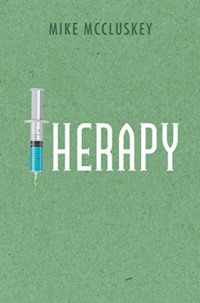Title: Therapy: The Poem Book
Author: Mike McCluskey
Publisher: XlibrisUS
ISBN: 978-1-9845-1352-6
Pages: 78
Genre: Poetry
Reviewed by: Allison Walker
Pacific Book Review
Poetry has long been associated with madness; poetry being the third kind of madness, which is possession by the Muses, according to Plato. Author and poet Mike McCluskey knows there is a kind of madness in his soul, and he channels it into his poetry. His collection of poems, titled Therapy: The Poem Book, are his own self- proclaimed, self-prescribed medicine for his madness.
The collection could be described as horror poetry, focusing on the theme of suffering. McCluskey’s photos printed throughout depict the doctor and the skeleton, life and death. The collection includes a short poetic prose titled, “Grim,” which likewise captures the life and death of a tortured soul. Reading the poems and viewing the photography contained within Therapy, you get the sense of emotions needing to break free, and the restless mind yearning equally to destroy or to create. McCluskey’s poems are what happens when your thoughts so fill your mind that they break out through your fingers.
Perhaps as readers we love poetry so much because it reveals to us the hidden secrets in our own souls, and opens up a type of longing within us, which we were afraid to acknowledge. Poetry is the ultimate act of honest thoughts within oneself. Then, to make good poetry, you must be able delve into yourself and bring to surface your deepest emotions. McCluskey knows how to find his deepest, unfiltered emotions, and he isn’t afraid to bring them to the page. Yet while McCluskey may be very much familiar with his inner demons, his poems are written with too much self-control to call them an act of total honesty. The emotion is there, waiting to be revealed for all its rawness, but McCluskey inadvertently tames his poems with rhymes; seemingly rhyming for the sake of rhymes. His poems want the instinctive meter of Dante’s Inferno, but his hands haven’t figured out how to channel his own, original voice. The poetic prose, “Grim,” also struggles to find a natural rhythm. Insistence on rhyming forces McCluskey to make decisions which make “Grim” choppy in voice and plot. Because of the rhyming, it’s sometimes difficult to discern whether the poetry is intended to be serious, or if McCluskey intends his poems to be read satirically. Often, Therapy has dark undertones, yet a giddy rhythm.
We love poetry because it reaches into our hearts and shows us the pain and fear, or ebullient joy which lingers there. Therapy is remarkable for its unfiltered look into the heart of suffering, and as a poet, McCluskey is observant and unafraid, but he hasn’t yet developed a voice which seems uncontrived.


